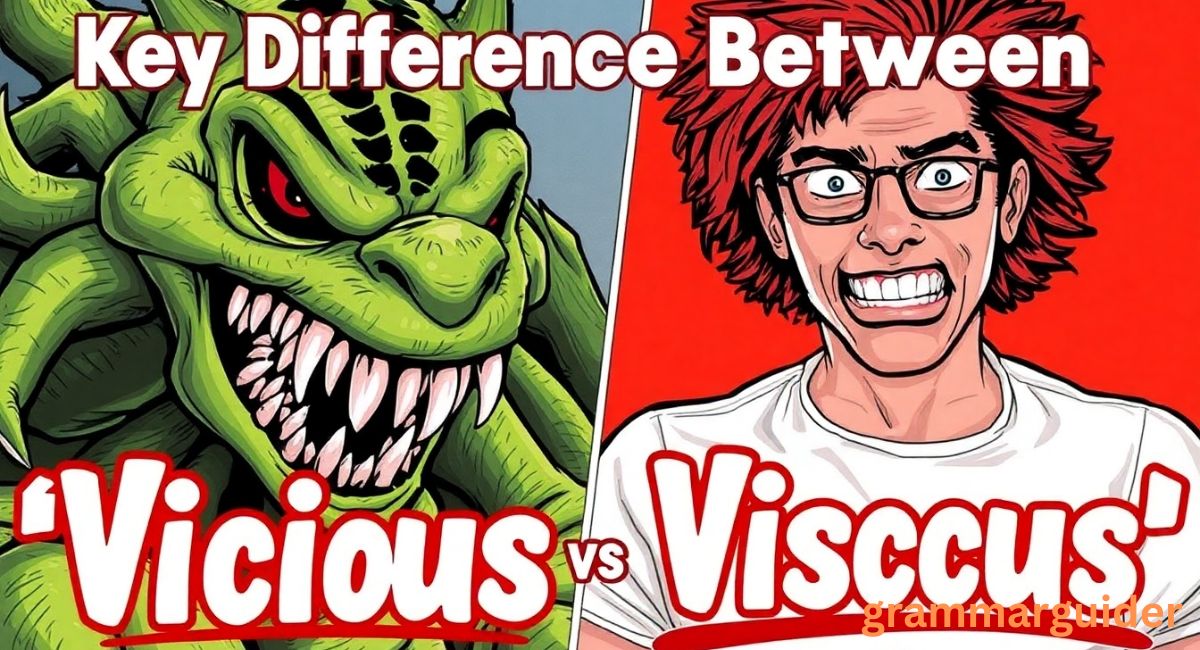Vicious vs Viscous English is a rich and nuanced language but with all its beauty comes confusion especially when it comes to words that sound similar but mean completely different things.
One such pair that often trips up writers is vicious and viscous. Although these words are phonetically similar their meanings and uses couldn’t be more different.
Why the Confusion Between “Vicious” and “Viscous”?
The primary reason these words are often confused is their similar pronunciation. Both words share the same ending sound, which makes them easy to mix up, especially for non-native speakers or anyone unfamiliar with their meanings.
On top of that, both words are adjectives, and English adjectives can sometimes seem interchangeable without considering the context. While vicious typically describes harmful behaviors or extreme cruelty, viscous refers to the physical properties of liquids, specifically how thick or sticky they are.
Despite their distinct meanings, the similarity in sound creates a common pitfall in both spoken and written language. Let’s dive deeper into each word and clarify how to use them properly.
What Does the Word “Vicious” Mean?
Vicious is an adjective that describes something extremely harmful, cruel, or aggressive. It is often used to refer to violent actions, harmful behavior, or dangerous circumstances. A vicious attack, for example, is one that is not just violent but also brutal and malicious. The word carries a negative connotation, implying that whatever it describes is severe, dangerous, and potentially life-threatening.
Usage of “Vicious”
- Cruel behavior: “Her vicious remarks hurt everyone in the room.”
- Violent actions: “The vicious dog lunged at the stranger.”
- Severe conditions: “The storm was vicious, causing widespread destruction.”
Synonyms of “Vicious” include:
Cruel, brutal, malicious, savage, ferocious, wicked, spiteful, nasty, ruthless, harsh.
Connotation of “Vicious”
The connotation of vicious is undeniably negative. It implies severity or danger, often describing unprovoked aggression or intentional harm.
What Does the Word “Viscous” Mean?
In stark contrast to vicious, viscous is an adjective used to describe a substance, typically a liquid, that is thick, sticky, and resistant to flow. If a liquid is viscous, it means it has a high resistance to movement and does not flow easily. This term is commonly used in contexts like cooking, chemistry, manufacturing, and physics.
Usage of “Viscous”
- Liquids: “The syrup is so viscous that it barely pours from the bottle.”
- Substances: “The engine oil became more viscous as the temperature dropped.”
- Textures: “The batter was too viscous, making it difficult to spread.”
Synonyms of “Viscous” include:
Thick, sticky, gooey, syrupy, slippery, gluey, gelatinous, clammy, paste-like, oily.
Connotation of “Viscous”
The word viscous is neutral in its connotation. It simply describes the physical properties of liquids or semi-liquids without attaching any emotional or moral judgment to it.
Key Differences Between “Vicious” and “Viscous”

At this point, you should have a good sense of how each word is used. But to make sure you truly understand the difference, let’s compare the two side by side in a clear table:
| Category | Vicious | Viscous |
|---|---|---|
| Meaning | Extreme cruelty, harm, aggression | Thick, sticky, resistant to flow |
| Pronunciation | /ˈvɪʃəs/ (VISH-uhs) | /ˈvɪskəs/ (VISS-kuhs) |
| Usage Context | Harmful behaviors, dangerous actions, negative emotions | Liquids, materials, physical properties |
| Connotation | Negative, severe, dangerous | Neutral, descriptive of physical traits |
| Fields of Use | Social issues, criminal behavior, storms | Cooking, chemistry, physics, manufacturing |
| Examples | Vicious dog, vicious attack, vicious rumors | Viscous syrup, viscous oil, viscous batter |
Common Mistakes in Usage
Many people mix up these two words because of their similar sounds. Here are a few common mistakes:
Mistake 1: Using vicious when you mean viscous (e.g., “The soup is too vicious to eat”).
Mistake 2: Using viscous to describe a cruel or violent situation (e.g., “He made a viscous attack on his opponent”).
Always remember that vicious relates to negative, harmful actions, while viscous refers to the thickness or stickiness of a substance.
Examples in Context
Vicious:
Example 1: “The vicious storm caused havoc across the city, tearing down trees and power lines.”
- Here, vicious describes the storm’s intensity and destructive power.
Example 2: “The manager vicious criticism of the team members left them demoralized.”
- The word vicious indicates that the criticism was hurtful and unnecessarily harsh.
Viscous:
Example 1: “The viscous honey dripped slowly from the spoon, coating the sides of the jar.”
- In this case viscous describes the thick and sticky consistency of the honey.
Example 2: “As the temperature dropped, the viscous liquid in the pipes began to freeze, blocking the flow.”
- Viscous here refers to the thickness of the liquid, which causes it to move slowly.
Synonyms of “Vicious” and “Viscous”
Synonyms of “Vicious”:
- Cruel, brutal, malicious, savage, ferocious, wicked, spiteful, ruthless, harsh.
Synonyms of “Viscous”:
- Sticky, gooey, thick, syrupy, slippery, gelatinous, oily, paste-like, gluey.
Antonyms for Both Words
- Vicious: Kind, gentle, friendly.
- Viscous: Thin, runny, liquid.
By understanding the synonyms and antonyms for both words, you can expand your vocabulary and use these terms in a broader context while ensuring the correct usage.
Origins of “Vicious” and “Viscous”
Origins of “Vicious”:
- The word vicious comes from the Latin vitiosus, meaning “full of faults” or “corrupt.” Over time, it evolved to describe harmful or aggressive behavior. Its use in Middle English as vicis further shaped its current form and meaning.
Origins of “Viscous”:
- Viscous comes from the Latin viscosus, which means “sticky” or “adhesive.” It entered English through Anglo-French, maintaining its focus on describing substances with a sticky, thick texture.
Quick Tips for Remembering the Difference
To help remember when to use each word try these mnemonics:
- Vicious: Violence and Violent actions. If the word refers to something harmful, it’s likely vicious.
- Viscous: Very Intriguing Substance (V-I-S) think about the texture of liquids when you see “viscous.”
Conclusion
Using vicious and viscous correctly is not just about avoiding embarrassing mistakes but also about making sure your writing is clear and effective. As you’ve seen vicious refers to harmful or cruel behaviors, while viscous describes the thickness or stickiness of liquids.
Remember the pronunciation differences (VISH-uhs for vicious, VISS-kuhs for viscous) and their distinct usage contexts to avoid confusion.
The more you practice distinguishing between these two words, the easier it will become to use them correctly in your writing. Whether you’re describing a vicious storm or a viscous sauce, paying attention to these details will elevate your writing skills and make your communication more precise.

Jacob Harrison is the seasoned writer behind Grammar Insights, with over nine years of experience in the field. Passionate about language, he shares practical tips and strategies to help readers enhance their grammar and writing skills. With a friendly approach, Jacob makes learning accessible and enjoyable for everyone.

